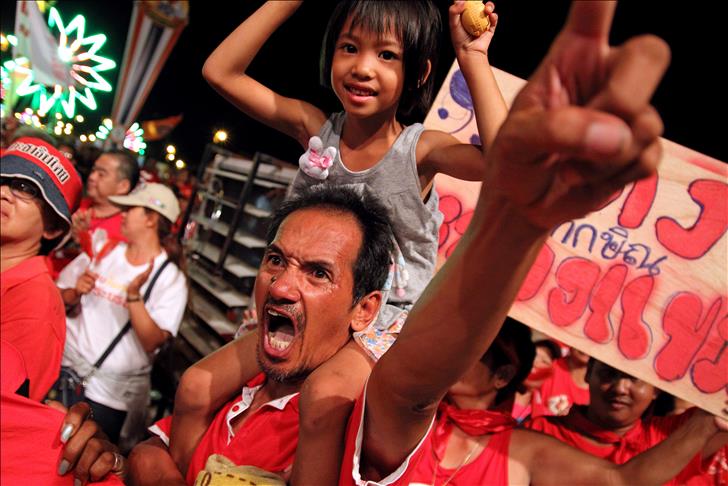Red Shirt dismisses Cambodia as base for exiled Thai gov't
Jakrapob Penkair tells Cambodian newspaper that an exiled resistance movement would be established, but most likely in a Western nation.

By Kate Bartlett
PHNOM PENH
A leading "Red Shirt"-in-exile has said that despite strong relations between Thailand's deposed Pheu Thai government and Cambodian Prime Minister Hun Sen the movement has no intention of setting up a previously touted government-in-exile in Cambodia.
Jakrapob Penkair told The Cambodia Daily that an exiled resistance movement would be established, but most likely in a Western nation.
“Our main goal of the setup is to prove the new military regime in Thailand [is] illegal, anti-democratic, and extremely destructive to Thailand and to the international community," the newspaper reported him saying Monday.
"The activities will range from political-diplomatic to local-group coordinating.”
A government-in-exile was first floated by Red Shirt leader Natthawut Saikua in February, but in Thailand's North or Northeast - two areas where the movement has its strongest support.
The day after the coup, a legal adviser to Thaksin Shinawatra - an ex-Thai Prime Minister and elder brother of recently deposed Premier iYingluck Shinawatra - also mentioned the subject. Thaksin, a highly divisive figure, was himself deposed in a military coup in 2006 and now lives in exile, mostly in Dubai.
The adviser - Robert Amsterdam - stated "Active consideration is being given to the formation of a government-in-exile in the wake of the illegal seizure of power staged by General Prayuth Chan-ocha."
More recently, he told the Bangkok Post newspaper Sunday that “A government-in-exile would legally exist if any member of the former prime minister’s cabinet managed to escape Thailand.”
Following the coup, Yingluck and various politicians considered loyal to the Shinawatras were summoned by the military, told not to try and leave Thailand, and to report their movements around the region.
The weekend comments by Penkair - a government spokesman and minister in Thaksin’s 2006 government - come after Prime Minister Hun Sen announced last week that despite maintaining friendly relations with the deposed Thai government, the country would not allow a government-in-exile to be established in Cambodia as he could not "interfere in internal Thai politics."
Some analysts had speculated that Cambodia could be a possible location for such a government, as Hun Sen was a long-time ally and golfing partner of Thaksin, and various Thai politicians - among them Penkair - have fled Thailand for the country, having fallen afoul of its harsh Lese Majeste laws.
Nevertheless, Thaksin himself, who said on his Twitter account on hearing of the coup that he was “sad for Thailand," has not made any comment about such a government.
Penkair, however, also told the paper that he would likely lead a resistance organization "once it was established."
Relations between Bangkok and Phnom Penh - longtime historical foes - deteriorated sharply after Thaksin's 2006 ouster. The incoming military-backed government - headed by Abhisit Vejjajiva, a political adversary of Thaksin - opposed Cambodia's application to list a temple close to their shared border on the World Heritage list. The application, and the nationalism Thailand's complaints evoked, led to frequent border clashes between the two countries.
In the wake of last week's coup, the Thai military erected a 130-meter barbed wire fence on disputed land near the countries' borders, raising eyebrows among analysts as to why whenever Thailand has recently had a coup does the military seemingly try and initiate a quarrel with its neighbor.
There is also the matter of the last days of the Khmer Rouge. In the 1980s, after Pol Pot was overthrown, the Cambodian ultra-Marxist guerrillas - then fighting Hun Sen’s Vietnamese-backed government - fled to the Thai border where they formed, with other Cambodian political factions, a government-in-exile headed by late Prince Norodom Sihanouk and often crossed into Thai territory for protection.
The Khmer Rouge not only maintained a seat at the United Nations, they were also supported by Thailand, among other countries.
www.aa.com.tr
Anadolu Agency website contains only a portion of the news stories offered to subscribers in the AA News Broadcasting System (HAS), and in summarized form. Please contact us for subscription options.

